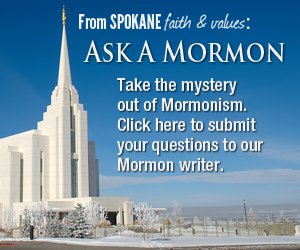Do you have a question about the Church of Jesus Christ of Latter-day Saints? Submit it online or fill out the form below.
Q. Emily, I've got one: Do you feel like you, as a member of the LDS church, are under more pressure to defend (or maybe 'contextualize' is the word) The Book of Mormon than other Christians are under to defend the Bible? I feel like there's a broad spectrum of perspectives on the Bible, among people I talk to, from 'it's a nice book with some good advice in it' all the way up to 'this is the factual and inarguable word of God', but I've got the sense from Mormon friends that this kind of discussion is less welcome in LDS circles. Do you agree? Do you think it's foundational to Mormon faith that Smith's accounts be taken as fact?
Thanks for opening up this conversation! I'm looking forward to seeing how it unfolds.
– Charlie
A. What a great question, Charlie! I would say that yes, members of the Church of Jesus Christ of Latter-day Saints are definitely under more pressure to “defend” the Book of Mormon than other Christians are to defend the Bible. A large part of that is because it is so unique. Thousands of denominations — including the Church of Jesus Christ of Latter-day Saints — use the Bible, while only a handful recognize the Book of Mormon as canonical scripture.
I think this can make Mormons seem “defensive” about the Book of Mormon, as well. There is an overwhelming amount of scholarly work that has been done on Bible: textual, linguistic, historical, and cultural research in many fields over many decades. The Book of Mormon has had extremely little done by comparison, but seems to be held to a higher standard of “proof” than the Bible. For example, no one is calling for the Old Testament to be thrown out because no archeological evidence of the Exodus has been found (learn more about archeology and the Book of Mormon, here). I think many Mormons chafe at that double standard.
Latter-day Saints view both the Bible and the Book of Mormon as “the word of God” (see Articles of Faith 1:8). For me that doesn’t mean that every word requires a strictly literal interpretation; some of the most beautiful and powerful passages of Scripture use figurative or metaphorical language. It means that these books of Scripture contain God’s message of love for all of his children. The subtitle of the Book of Mormon is “Another Testament of Jesus Christ,” and that accurately describes its purpose and content. Practically every page testifies to Christ’s identity as the Son of God and of his central role in our salvation as Savior and Redeemer.
Joseph Smith once said that the Book of Mormon is “the most correct of any book on earth.” Now, I don’t take that to mean that the Book of Mormon is perfect (see this earlier post regarding the Mormon view of scriptural inerrancy). The various original authors acknowledge their fallibility in the text and there are definitely editorial-type mistakes, which are simply evidence to me that imperfect people were involved in the process. In both the Bible and the Book of Mormon, you have the people who wrote the original account, the people who compiled and abridged the records, those who translated it, and the many people who read, interpret, and apply it today. Everyone at every step of that process is saddled with their own imperfections, biases, beliefs, and incomplete understandings, but were (and are) doing their best to express and understand the divine through the written word.
Do you have a question about the Church of Jesus Christ of Latter-day Saints? Submit it online or fill out the form below.
Loading…










